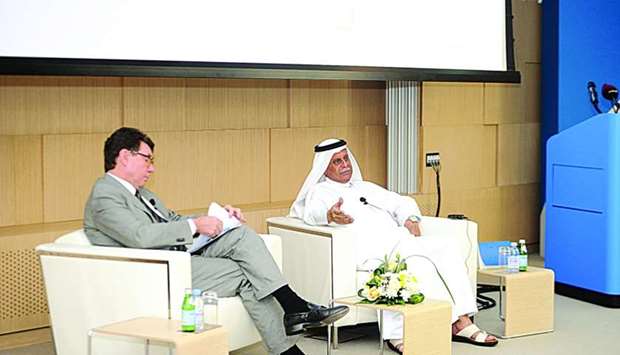More than 800mn people still live in extreme poverty; one out of nine people are starving; 2.5bn are without access to clean water and 1.3bn people have no access to modern electricity, al-Attiyah said, while sharing his views on ‘Sustainable development goals and energy nexus’ at the 2017 Energy Transitions Conference at the Hamad Bin Khalifa University (HBKU) here.
“It is against this backdrop that world leaders in September 2015 had adopted the 2030 Agenda for sustainable development, enshrining the 17 Sustainable Development Goals. It is important to understand the scale of ambition, transformation and fundamental common human values that the 2030 agenda embodies,” said al-Attiyah, the founder and chairman of the Abdullah Bin Hamad Al-Attiyah International Foundation for Energy and Sustainable Development.

HE al-Attiyah among other dignitaries at the 2017 Energy Transitions Conference at the Hamad Bin Khalifa University (HBKU) here.
Energy and sustainable development are two cornerstones of the work of the Al-Attiyah Foundation, al-Attiyah noted.
“I am pleased to highlight the role of the energy sector in achieving the 17 United Nations Sustainable Development Goals (SDGs),” he said.
Dr Ahmad M Hasnah, HBKU president, said, “We strongly believe that by partnering and leveraging synergies with our local stakeholders, we will be able to generate ideas that will have wider impact on our community. We are truly honoured to have hosted this conference with our partners drawing an experienced number of academics and professionals from around the world. Their expert insights at this conference have highlighted the vital need for such an open discussion in the country – and through our joint research contribution on water security, challenges, and energy, HBKU continues to contribute to finding solutions that address Qatar’s national challenges.”
Dr Hassan al-Derham QU President said, “This conference is a significant opportunity to highlight issues related to water, energy and food. In light of the unjust and unexpected blockade imposed on Qatar, the country has undertaken stable and strong steps towards food security and the manufacturing of products to meet the demands of society. This conference provides an important platform to discuss the current situation, to provide a scientific perception of the future and to create solutions that fulfill local needs, in line with the country’s strategic goals.”
The conference was co-organised with Qatar University (QU) and the College of North Atlantic – Qatar, with active participation from HBKU’s Qatar Environment and Energy Research Institute (QEERI).
By adopting a deliberative process, the conference highlighted various challenges and their possible solutions to inspire public participation, and encourage meaningful public input into the key components of Qatar’s vision of a sustainable future, especially in the areas of water, food and energy, which can decisively impact the population.
By bringing this discussion into the public sphere and examining the facts and opportunities, the forum also aims to motivate the population of Qatar to integrate sustainable practices into their lifestyles.
The conference, which was hosted by HBKU’s College of Law and Public Policy, ran four interdisciplinary workshops encompassing the themes of technology, law, management and education.

HE Abdullah bin Hamad al-Attiyah sharing his views on sustainable development at the 2017 Energy Transitions Conference at the Hamad Bin Khalifa University in Doha.
Sustainable development is undoubtedly one of the biggest challenges the world continues to face today, said HE Abdullah bin Hamad al-Attiyah.
